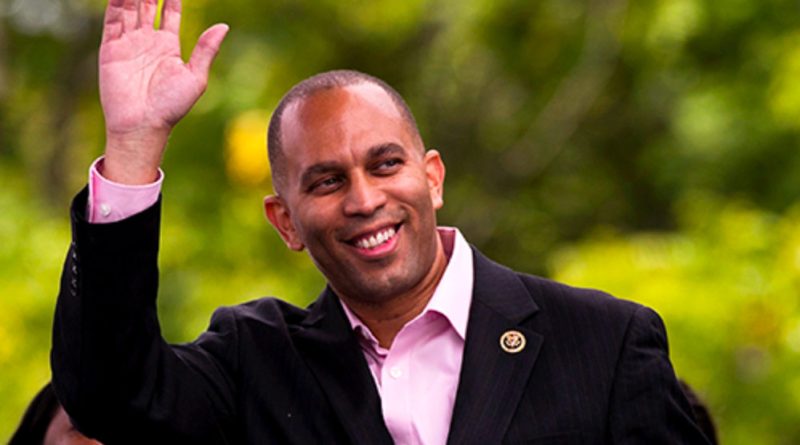Missing the Point – The Republicans’ Problem With Majority Rule
Republicans don’t believe in majority rule. Recent votes in the House Republican Conference are proof positive of this heresy, this lack of commitment to a fundamental principle of our democracy.
The Conference keeps nominating one of its members to be Speaker, but then can’t get enough of those members to vote for their nominee when the matter is called before the entire House. There’s nothing, in other words, about getting a majority of the votes in the Conference that assures a nominee that Republicans who voted against him in the Conference will yield to the will of the majority of its members.
For democracy to work we need four things to be true.
1. We need to have and demonstrate respect for the other citizens who are in it with us. We don’t have to agree with them, but we do need to appreciate legitimate differences of opinion offered in the context of civilized debate.
2. We need knowledge of what’s going on around us – to which end constitutional guarantees of freedom of speech and the press are essential.
3. We need to tell the truth, to ourselves as well as to others – and act on that truth instead of subscribing to some alternate reality for self-serving political purposes.
4. We need to believe in or at least concede to the wisdom of the crowd out of respect for what most people deem to be in their best interests.
And so, with respect to that fourth item – at least when it comes to making government policy and subject to compromise – we’ve all agreed, in principle, to go along with what most of us want to do. This point is called “majority rule.” Without it, it would be impossible to get anything done because universal agreement on any major question is never going to happen.
The Republican Conference in the House keeps meeting to choose a Speaker. Ideally, the Speaker – particularly in a House so evenly divided between our two major parties – should be a skilled, independent administrative manager, but not necessarily the leader of the conference for the majority party. But that’s not the way it works. The Speaker is the most senior political authority in the House, second in line of succession for the Presidency.
After all due deliberation, screaming, and name-calling behind closed doors, someone wins a majority of the Conference votes and is, therefore, the Republican nominee for Speaker. Maybe it’s someone whose candidacy is adamantly opposed by a significant number of his or her colleagues, but he or she is the nominee, the “Speaker Designee,” nonetheless.
All candidates have pledged to support this nominee, but other members of the Conference have not, and that’s the rub. Absent a unanimous decree by the 217 members of the Conference, there’s no rule requiring members to vote for their nominee when the election is held on the floor of the House. Without the necessary 217 Republican votes it takes to win, the Republican nominee loses and the position of Speaker of the House remains unfilled – all because the Republicans don’t believe in majority rule. Their nominee received a majority in the Conference vote, but so what?
Republicans clearly don’t respect each other. The reality is that some, maybe even a lot of them, are so self-absorbed, so intolerant of other people’s points of view as to believe that only their personal opinions matter. That the majority of their Conference believes one thing is of no consequence to the members whose candidates for Speaker weren’t nominated. Their philosophy is simple and simple-minded. “It’s my way or the highway.”
Understandably, in a conference of over two hundred Republicans, you’re going to have a variety of strong opinions. There will be factions. Factions among which differences may be significant, maybe even profound. Factions among which the differences are multidimensional, some based on one’s understanding of facts, others upon differences in philosophies of government and economics, others on the politics of the moment and a desire for power that overrides concerns for one’s constituents and for the people in general. For some, it’s all about breaking the system which they can’t find another, more civilized and respectful way to influence.
While some factions are arguing about policy, others are thinking in terms of popular politics or about solutions that will benefit them personally. The problem is, you can’t have a civilized and productive debate with someone if their reaction to your comments isn’t based on what I’ll call “tolerant logic.” These factions in the Republican Conference are a Tower of Babel, thinking and arguing with each other at cross-purposes.
What do we do to fix this Republican Party? The permanent solution is to defeat the principal offenders at the polls. Crush their movements, and break up their factions by throwing them out of the House. But who has the time for that? In the meantime, we need a Speaker. Democrats in the House could help by voting for the most reasonable, most bi-partisan Republican candidate they can find, but who is that person, and wouldn’t Democratic support effectively trash his or her standing in the Republican Conference?
Or the Republican Conference could just pass a rule that mandates unanimous support for the Conference nominee? It’s just that simple. …Nah. Remember, they don’t believe in majority rule.
Good news. There’s another option.
Let’s say that the nominee of the Republican Conference can’t get the majority of the total House vote he or she needs to win. Too many Republicans can’t get over themselves and refuse to respect the wishes of the majority of their own Conference. Out of frustration, when the clerk calls the individual members of the House for a second vote, a lone Republican rises – and casts his vote for Hakeem Jefferies, leader of the Democratic Caucus. Jeffries, according to this fantasy I’m having, in secret meetings the night before, has agreed to run the House in a truly fair and bipartisan manner.
“As the Republican Representative for the great state of whatever, I stand to cast my vote for House Democratic Minority Leader Hakeem Jeffries to be the bipartisan Speaker of this House of Representatives – and implore my Republican colleagues to do the same to save our country and party.” Words to that effect.
It’s only one historic, crossover vote but, buoyed by the audacity and courage of the one, a second Republican, and then a third and more put country above party and follow suit. Most Republicans are furious, of course. Some of them wanted chaos and now that’s exactly what they’ve got. (Careful what you wish for.) But others will feel relieved that order is restored.
The House is almost evenly split with a Republican majority of only a few votes. If the Republicans keep up whatever they’re currently doing, particularly given the ongoing crises currently on the table, they won’t have their majority for long. Now’s the time for a handful of them to make the big, bold, bipartisan move, put the House back to work, and save their party from the suicide it’s in the process of committing at our expense.
FYI, as I’m writing a first draft of this piece on Tuesday afternoon, I’ve looked up at the flat screen in my office on which CNN is playing to hear that Minority Whip Tom Emmer, who was nominated by the Republican Conference just hours, has now dropped out as nominee. He’s resigned his nomination under attack by a candidate for President and soon-to-be-convicted Donald Trump and, mostly, for lack of enough Republican support to be elected by the total House.
It’s evening now and Congressman Mike Johnson has just been nominated by the Conference – their fourth Speaker Designee in the past three weeks – with only 128 of the 217 votes he needs. A majority of the Conference, but not of the House.
So now, who wants to share my vision of a bipartisan deal? All it takes is a literal handful of courageous Republicans willing to put their country first. Hakeem Jefferies is waiting to hear from them.
Listen carefully to the first response by Jeffries in the PBS NewsHour interview that occurred when House Majority Leader Steve Scalise was nominated by the Republican Conference. Unable to obtain the full support of his Conference, Scalise dropped out before a vote was called on the floor of the House.
To quote Florida Congressman Mike Waltz last night, “My fear is that if we keep doing this somebody is going to side with the Democrats.”
Maybe my dream isn’t so far-fetched after all.

Les Cohen is a long-term Marylander, having grown up in Annapolis. Professionally, he writes and edits materials for business and political clients from his base of operations in Columbia, Maryland. He has a Ph.D. in Urban and Regional Economics. Leave a comment or feel free to send him an email to [email protected].

